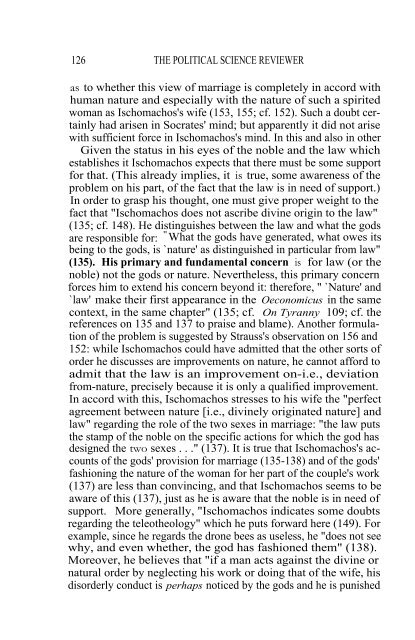Strauss on Xenophon's Socrates Xenophon's Socratic Discourse: An ...
Strauss on Xenophon's Socrates Xenophon's Socratic Discourse: An ...
Strauss on Xenophon's Socrates Xenophon's Socratic Discourse: An ...
Create successful ePaper yourself
Turn your PDF publications into a flip-book with our unique Google optimized e-Paper software.
126 THE POLITICAL SCIENCE REVIEWER<br />
as to whether this view of marriage is completely in accord with<br />
human nature and especially with the nature of such a spirited<br />
woman as Ischomachos's wife (153, 155; cf. 152). Such a doubt certainly<br />
had arisen in <strong>Socrates</strong>' mind; but apparently it did not arise<br />
with sufficient force in Ischomachos's mind. In this and also in other<br />
Given the status in his eyes of the noble and the law which<br />
establishes it Ischomachos expects that there must be some support<br />
for that. (This already implies, it is true, some awareness of the<br />
problem <strong>on</strong> his part, of the fact that the law is in need of support.)<br />
In order to grasp his thought, <strong>on</strong>e must give proper weight to the<br />
fact that "Ischomachos does not ascribe divine origin to the law"<br />
(135; cf. 148). He distinguishes between the law and what the gods<br />
are resp<strong>on</strong>sible for: " What the gods have generated, what owes its<br />
being to the gods, is `nature' as distinguished in particular from law"<br />
(135). His primary and fundamental c<strong>on</strong>cern is for law (or the<br />
noble) not the gods or nature. Nevertheless, this primary c<strong>on</strong>cern<br />
forces him to extend his c<strong>on</strong>cern bey<strong>on</strong>d it: therefore, " `Nature' and<br />
`law' make their first appearance in the Oec<strong>on</strong>omicus in the same<br />
c<strong>on</strong>text, in the same chapter" (135; cf. On Tyranny 109; cf. the<br />
references <strong>on</strong> 135 and 137 to praise and blame). <strong>An</strong>other formulati<strong>on</strong><br />
of the problem is suggested by <str<strong>on</strong>g>Strauss</str<strong>on</strong>g>'s observati<strong>on</strong> <strong>on</strong> 156 and<br />
152: while Ischomachos could have admitted that the other sorts of<br />
order he discusses are improvements <strong>on</strong> nature, he cannot afford to<br />
admit that the law is an improvement <strong>on</strong>-i.e., deviati<strong>on</strong><br />
from-nature, precisely because it is <strong>on</strong>ly a qualified improvement.<br />
In accord with this, Ischomachos stresses to his wife the "perfect<br />
agreement between nature [i.e., divinely originated nature] and<br />
law" regarding the role of the two sexes in marriage: "the law puts<br />
the stamp of the noble <strong>on</strong> the specific acti<strong>on</strong>s for which the god has<br />
designed the two sexes . . ." (137). It is true that Ischomachos's accounts<br />
of the gods' provisi<strong>on</strong> for marriage (135-138) and of the gods'<br />
fashi<strong>on</strong>ing the nature of the woman for her part of the couple's work<br />
(137) are less than c<strong>on</strong>vincing, and that Ischomachos seems to be<br />
aware of this (137), just as he is aware that the noble is in need of<br />
support. More generally, "Ischomachos indicates some doubts<br />
regarding the teleotheology" which he puts forward here (149). For<br />
example, since he regards the dr<strong>on</strong>e bees as useless, he "does not see<br />
why, and even whether, the god has fashi<strong>on</strong>ed them" (138).<br />
Moreover, he believes that "if a man acts against the divine or<br />
natural order by neglecting his work or doing that of the wife, his<br />
disorderly c<strong>on</strong>duct is perhaps noticed by the gods and he is punished

















